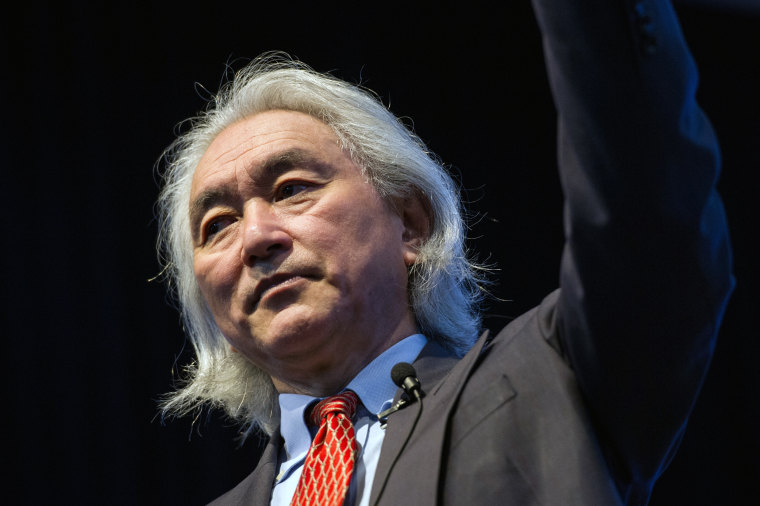The new administration has withdrawn to its corner for now, recovering from a series of court rulings holding that executive orders stopping travel from seven Muslim majority countries are illegal.
But President Donald Trump has vowed to keep trying, even as medical, scientific and technology groups work every possible angle to get employees and students through the new barriers.
Trump frames the travel ban as an issue of national security. In reality, says Dr. Michio Kaku, the nation's safety — along with its prosperity — rely on immigration.
Related: Will the Future of Tech Be a 'Disaster' Under Trump?
Without immigration, "we’d be a third-rate country," says Kaku, the well-known author of "The Future of the Mind" and other books and a professor of physics at City College of New York. "Most of the prosperity that we see around us is due to the genius of the people that came in the so-called brain drain. There is a brain drain into the United States.”
Being able to attract the world's best and the brightest gives the U.S. a huge advantage, Kaku says. It makes for a bigger pie, so everyone gets more.
“The political world view is that it’s a zero-sum game,” Kaku says. “People think you have to cut the pie thinner and thinner.”
Kaku says the influx of immigrants doesn't cost native-born Americans their jobs, or at least not to any significant extent. “These people do not replace American workers," he says. "They create new industries."
“Oceans of immigrants” started flocking to U.S. universities after World War II, says Kaku, himself the son of Tibetan-Japanese immigrants.“They are the cream of the cream of the cream."
He points especially to the H-1B visa, created in 1990 to bring in skilled workers for the tech industry.
“The H-1B visa is called the 'genius visa' for a reason,” Kaku says. The visas are given to people who usually have at least a bachelor’s degree and a dozen years of work experience in fields like medicine and engineering. Employers apply for the visas on behalf of applicants and win them through a lottery. Every year, 85,000 H-1Bs are awarded.
Related: Doctors, Scientists, Denounce Trump Immigration Order
“You don’t, of course, have to be a genius,” Kaku says. “But you are at the top level of education. You have a Ph.D in computer science, a Ph.D. in chemistry, a Ph.D. in physics. And these are the people that drive entire industries.”
Some critics say the visas are just a funnel to bring in cheap labor for big tech companies, and Trump has promised to overhaul the H-1B system. But Kaku urges caution.
“Why commit technological suicide by restricting the flow of talent into the United States?” he asks. “Other countries would give their eyeteeth to have this flow of scientists into their country. They are envious of the United States, and if we fritter it away, what a waste.”
Kaku calls our high school system "one of the worst known to science,” Kaku says. That's an exaggeration, though not a huge one. The U.S. actually scores about in the middle on international tests of reading, math, and science.
“Why commit technological suicide by restricting the flow of talent into the United States?”
The Trends in International Mathematics and Science Study (TIMSS) test, which compares rich, industrialized countries with less-developed countries, usually puts the U.S. at slightly above the international average.
Still, the U.S. scores behind Hong Kong, Singapore, Taiwan, Japan and South Korea. And the National Assessment of Educational Progress (NAEP) — considered a sort of a national report card — shows that a third of American eighth-graders are proficient or better in math and reading.
So colleges and universities have to bring graduates up to a certain level before they can start educating them further, Kaku says. “We take raw people from high school and we waste the first year with remedial training. We can’t rely on that forever.”
According to Kaku, having immigrants with training and work experience provides a shortcut to innovation, according to Kaku--and the numbers back him up. A report out last week from the New American Economy finds that foreign-born residents contributed $232.9 billion to Los Angeles County’s gross domestic product in 2014. It found that immigrants made up 51.5 percent of Los Angeles County’s entrepreneurs and generated $7.2 billion in business income.
Related: Protecting Your Internet Presence in the Age of Trump
Los Angeles Mayor Eric Garcetti certainly sees the financial value of immigrants.
“People from all over the world are a driving force in an economic resurgence that has seen us create 146,000 new jobs and register 170,000 businesses over the last three years,” Garcetti said last week at a press conference. “L.A. became one of the world’s great cities by embracing immigration and diversity."
A report last year on immigration from the National Academies of Sciences, Engineering and Medicine found that while 16 percent of the U.S. workforce is foreign born, immigrants account for nearly a quarter of physicians and dentists and close to 29 percent of scientists, 19.5 percent of engineers and 23.5 percent of computer specialists.
Immigrants contributed $2 trillion to the economy last year, the report concludes.

